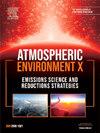Quantifying particulate matter emission rates from naturally ventilated dairy buildings by considering roof opening contributions
IF 3.4
Q2 ENVIRONMENTAL SCIENCES
引用次数: 0
Abstract
Roof openings are typically fitted to naturally ventilated dairy building (NVDB) for better ventilation but their impact on air pollutant emission calculations has not been fully considered. Particulate matter (PM) emission rate (ER) for NVDB rely on the total ventilation rate (VR), outdoor PM concentration and average indoor PM concentration sampled either under the roof (Roof Sampling) or in the cubicle area (Cubicle Sampling), which may show large deviations due to its spatiotemporal variation of PM concentrations and complex airflow patterns. This study utilised a novel ER calculation method (Joint Sampling) that computes the respective emission from the roof and sidewall openings by matching each outlet's VR and PM concentration. By year-round field measurements of PM2.5 and the total suspended particulates (TSP), results showed that annual average ERs of PM2.5 and TSP were 10.8 mg h−1 cow−1 and 45.7 mg h−1 cow−1 for Roof Sampling, 12.7 mg h−1 cow−1 and 40.7 mg h−1 cow−1 for Cubicle Sampling, and 11.7 mg h−1 cow−1 and 45.9 mg h−1 cow−1 for Joint Sampling. Considering the Joint Sampling results were relatively true, Roof Sampling exhibited a maximum underestimate of PM2.5 emissions of 20.8% when sidewall curtains were fully opened, whilst Cubicle Sampling demonstrated a maximum overestimate of TSP of 10.2% when the aperture was closed. Using Joint Sampling, the roof opening contributed 39.3% and 24.4% of the annual PM2.5 and TSP emissions. When sidewall openings are partially or fully closed, the Joint Sampling calculation is preferable to estimate the ER of PM.
通过考虑屋顶开口的贡献,量化自然通风乳制品建筑的颗粒物排放率
自然通风奶牛场(NVDB)通常会安装屋顶开口,以提高通风效果,但尚未充分考虑屋顶开口对空气污染物排放计算的影响。自然通风奶牛场的颗粒物(PM)排放率(ER)取决于总通风率(VR)、室外 PM 浓度以及屋顶下(屋顶采样)或隔间内(隔间采样)采样的平均室内 PM 浓度,由于 PM 浓度的时空变化和复杂的气流模式,这些数据可能会出现较大偏差。本研究采用了一种新颖的 ER 计算方法(联合采样),通过匹配每个出口的 VR 和 PM 浓度,计算出屋顶和侧壁开口处各自的排放量。通过对 PM2.5 和总悬浮颗粒物(TSP)的全年实地测量,结果表明,屋顶采样法的 PM2.5 和 TSP 年均 ER 值分别为 10.8 毫克/小时-1 牛-1 和 45.7 毫克/小时-1 牛-1;隔间采样法的 PM2.5 和 TSP 年均 ER 值分别为 12.7 毫克/小时-1 牛-1 和 40.7 毫克/小时-1 牛-1;联合采样法的 PM2.5 和 TSP 年均 ER 值分别为 11.7 毫克/小时-1 牛-1 和 45.9 毫克/小时-1 牛-1。考虑到联合采样的结果相对真实,当侧壁窗帘完全打开时,屋顶采样显示 PM2.5 排放量的最大低估值为 20.8%,而当隔间采样显示开孔关闭时,TSP 的最大高估值为 10.2%。通过联合取样,屋顶开口分别占全年 PM2.5 和 TSP 排放量的 39.3% 和 24.4%。当侧壁开口部分或全部关闭时,联合取样计算方法更适合用于估算 PM 的 ER。
本文章由计算机程序翻译,如有差异,请以英文原文为准。
求助全文
约1分钟内获得全文
求助全文
来源期刊

Atmospheric Environment: X
Environmental Science-Environmental Science (all)
CiteScore
8.00
自引率
0.00%
发文量
47
审稿时长
12 weeks
 求助内容:
求助内容: 应助结果提醒方式:
应助结果提醒方式:


